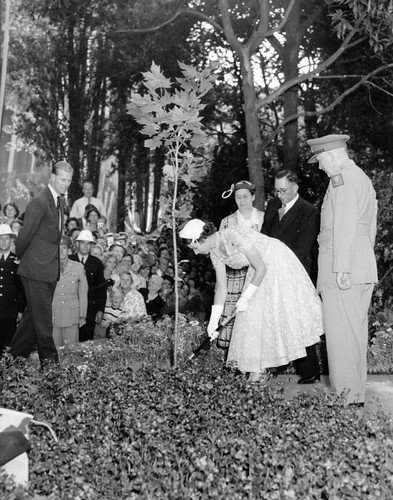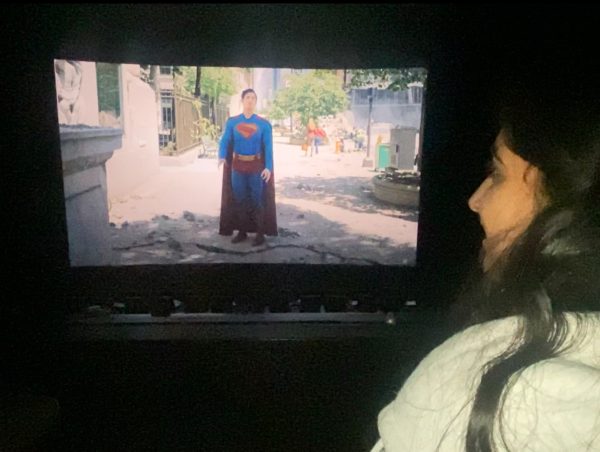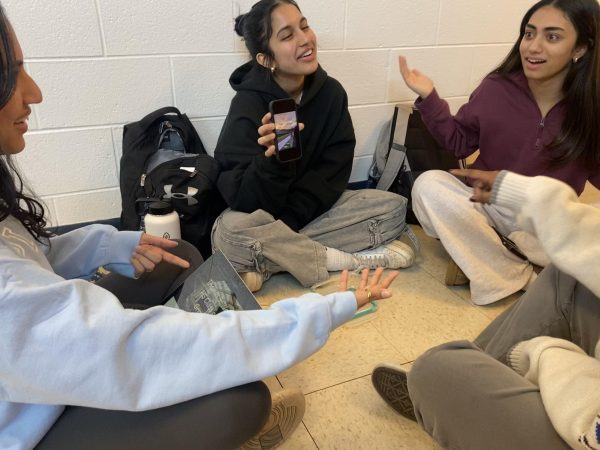The World is Ending: Queen Elizabeth, dead?

Photo by Australian Broadcasting Corporation ; used with permission from Google Creative Commons
A young Queen Elizabeth II plants a tree while on a diplomatic world tour. Her husband, Prince Phillip, watches.
Is our global community on the brink of descending into anarchy?
On Sept. 8, at the age of 96, Queen Elizabeth II died, leaving the United Kingdom without a queen. She was queen for 70 years, making her the second-longest-reigning monarch in world history, according to The Washington Post. The only person to ever rule for longer than Elizabeth was King Louis XIV of France, who took the throne at age four and ruled for 72 years from 1643-1715.
According to European history teacher Amy Pollin, Elizabeth’s role as queen was to be the face of the country. “She wasn’t making any laws or enforcing any laws or being the judge of anything. She helped England through times of unrest — for example, attacks, storms, or issue driven things — because she could rally support and bring attention to those topics,” Pollin said.
And Elizabeth, though only 25 years old when she became queen, rose to her duty with utmost dedication. She reigned through post-WWII reconstruction, the decline of British influence in India, Cold War tensions, the building and tearing down of the Berlin Wall and a global pandemic. In Oct. 1986, just two years after Britain gave control of Hong Kong back to China (as per the Treaty of Nanking), she became the first British monarch to ever visit China, and in May 2011 she was the first British monarch to make a state visit to Ireland since it had been part of the United Kingdom. Despite being, as Pollin said, a mere figurehead in politics, Elizabeth’s bold diplomacy was a significant step towards improving relations between the countries.
Elizabeth reigned during a period when the British were in decline. They were losing their colonies, the US and Soviet Union emerged as dominant world powers during the Cold War and China began to rapidly industrialize. “A lot of people say the monarchy is outdated,” Pollin said. “[But] Queen Elizabeth was so impressive that people can be against monarchies and still love her specific reign.”
Most people alive today have never known another monarch except for Elizabeth, who has reigned over the United Kingdom and 14 commonwealth nations (including Australia, Antigua and Barbuda, Bahamas, Canada, Jamaica and New Zealand) since 1952.
So, what are all these nations going to do with their leader of 70 years gone?
Elizabeth’s son, now King Charles III, has taken Elizabeth’s role as the head of state of Great Britain and her 14 commonwealth nations. However, the commonwealth countries might not look as kindly upon having Charles as the face of their nation as they did Elizabeth. Just one week after Elizabeth’s death, Antigua and Barbuda’s Prime Minister Gaston Browne revealed that he has tentative plans to “hold a referendum on casting off the monarchy ‘probably’ within the next three years,” according to the Washington Post.
Browne’s choice to hold a referendum reflects the surge of people who have spoken out since Elizabeth’s death with the intention to highlight her shortcomings in leadership as well as her successes, and offer commentary on the practice of a monarch ruling over sovereign countries — even if only in a ceremonial position. “I understand that while a lot of people felt a sense of stability in having this one person be a ruler for a long period of time, a lot of atrocities were also committed in other countries under her rule,” senior Connor Lindauer said. “She wasn’t just a figurehead. She witnessed apartheid, the bloody rallies in Ireland, and she didn’t really do anything.”
So, will the world descend into anarchy now that Queen Elizabeth II is dead?
With 40-year-old Prince William and his nine-year-old son, Prince George, next in the British line of succession, it is unlikely we will ever see a queen again in our lifetimes. But, a woman can always be elected Prime Minister, which would give them more power in government than the ceremonial role of Queen, anyway.
Commonwealth nations might finally sever their ties with Britain once and for all, bringing an end to a centuries-long traditional role. But, this political decision might provide a sense of freedom and identity to the countries and their citizens.
The world isn’t ending… yet.
Your donation will support the student journalists of Thomas S. Wootton High School. Your contribution will allow us to purchase equipment and cover our annual website hosting costs.
Catie is a 2023 graduate.






